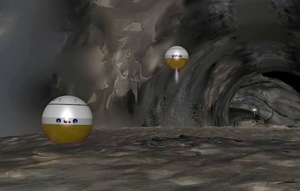Nov 19 2014
Need to explore a place where even sophisticated robots can't go? It's a tough job, but something's got to do it.
This semester's final ASU public Earth & Space Open House is all about "Extreme Robotic Exploration." Find out what's involved, from 7 to 10 p.m., Nov. 21, at the Interdisciplinary Science and Technology Building IV (ISTB 4) on ASU’s Tempe campus.
 Swarms of ball-shaped robots may be able to explore places such as lunar caves or lava tubes, where more sophisticated landers or rovers cannot safely go. Photo by: Arizona State University/Jekan Thanga
Swarms of ball-shaped robots may be able to explore places such as lunar caves or lava tubes, where more sophisticated landers or rovers cannot safely go. Photo by: Arizona State University/Jekan Thanga
Visitors to the free event can attend a public lecture by the School of Earth and Space Exploration's Jekan Thanga. His topic is "Exploring Extreme Environments on the Moon and Mars using a Flying Network of Ball Robots."
Thanga's talk will address the feasibility of using small robots to explore environments on the moon and Mars, where larger and more expensive robotic spacecraft can't safely go. Small robots, however, could be deployed from landers or rovers, making accessible such locations as canyons, lava tubes and caves, that would otherwise be out of reach. The talk will be given at 8:15 p.m. in room 240.
Besides the public lecture, this open house will feature the inaugural appearance of the Icarus Rocketry team, ASU's high-power rocketry competition team.
In addition, there will be two 3-D planetarium shows titled "Measuring Distances in the Universe" in the Marston Exploration Theater at 7:15 and 8:45 p.m. All seating is on a first-come basis.
As usual, there will be telescope sky viewing outdoors next to the James Turrell Skyscape art installation from 8 to 10 p.m. (weather permitting). Don't miss the many exciting demonstrations and activities in the state-of-the-art ISTB4 Gallery of Scientific Exploration by experts in astrobiology, geology, cosmology and planetary science – and don't leave without picking up your free poster.
To get to the open house, go to the main entrance of ISTB 4, located on the building’s north side.
The monthly open house is sponsored by the School of Earth and Space Exploration, GeoClub, AstroDevils: ASU Astronomy Club, Icarus Rocketry, Students for the Exploration and Development of Space (SEDS) and the Center for Meteorite Studies (CMS).
For more information, visit http://earthspaceopenhouse.weebly.com or visit the school's Facebook event page. The next open houses will be on Feb. 20, March 27 and April 24, 2015.